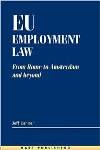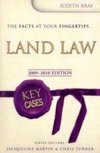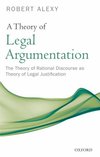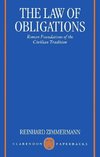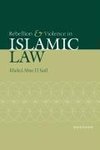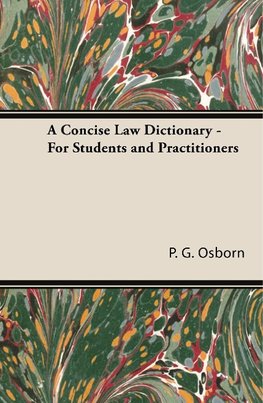
-
 Anglický jazyk
Anglický jazyk
A Concise Law Dictionary - For Students and Practitioners
Autor: P. G. Osborn
Text extracted from opening pages of book: CONCISE LAW DICTIONARY FOR STUDENTS AND PKACTITIONEBS WITH SUMMARIES OF THE LEADING CASES AND A TRANSLATION OF ROMAN LAW TERMS AND LATIN MAXIMS. BY P. G. OSBORN. LL. B. Of University College, London, of Oray's Inn,... Viac o knihe
Na objednávku
40.86 €
bežná cena: 45.40 €
O knihe
Text extracted from opening pages of book: CONCISE LAW DICTIONARY FOR STUDENTS AND PKACTITIONEBS WITH SUMMARIES OF THE LEADING CASES AND A TRANSLATION OF ROMAN LAW TERMS AND LATIN MAXIMS. BY P. G. OSBORN. LL. B. Of University College, London, of Oray's Inn, Barri& ter-at-Law and of the Inland Revenue Department. LONDON : SWEET & MAXWELL, LIMITED, 2 & 3 CHANCERY LANE, W. C. 2. TORONTO : THE CAR8WELL COMPANY, LIMITED. SYDNEY, MELBOURNE, BRISBANE: THE LAW BOOK COMPANY OP AUSTRALASIA, LIMITED. 1927; ( Printed in England.) PREFAB. VVP^ THIS book is an attempt to provicre a concise law dictionary for the use of the practitioner and the student, in which the words and phrases, the rules and doctrines of the law of England, are defined and explained. Matter of mere antiquarian interest has been excluded, and space has been found to give on subjects of importance fuller notes than are usually attempted. For instance, in addition to the ordinary definition of an infant, I have endeavoured to state concisely his liability in contract and tort, with a reference to the cases. To assist the student in his reading, the more important terms of the Roman Law have been included. To write a law book without cases is like building a house without foundations. This Dictionary is unique in my experience in. giving a summary of the leading cases in all the important branches of the law. The principle laid down or exemplified by the case is stated together, where necessary, with a brief statement of the facts, and the decision. References to the cases are made throughout under the proper headings. The student has to become familiar with a good many cases, and these notes, in a convenient form for reference, should prove of assistance. As the titles are arranged in strict alphabetical order, no references are of course given to pages. iv PREFACE. The effect of the new Property Acts and other recent statutes has been noted. I am under a particular obligation to Mr. Byrne for the free use I have made of his monumental Law Dictionary, and to Mr. J. L. Montrose, LL. B., Barrister at-Law, for reading the proofs and making many suggestions. I am indebted to my brother Mr. Harold Osborn and to Miss Helene Ross, B. A,, of University College, for their invaluable assistance. Any imper fections which may appear I very much regret, but the sacrifice of many leisure hours will not have been in vain if I am able to help the student along his interest ing but intricate way. P. G. 0. Work, work while it is yet day, and in your lives let there be no misspent hours. ( WiLLis, Law of Negotiable Securities, 4th ed., p. 171.) ( y ) LATIN FOR LAWYERS. ACCENT AND PRONUNCIATION. Accent. ( 1) In words of two syllables the accent is always on the first. E. g., bo-na, ju'-ris, / 6-rum. ( 2) In words of three or more syllables, the accent falls on the last syllable but one ( penultimate) if its vowel sound is long, but otherwise on the last but two ( ante-penultimate). E. g., tnan-da'-ta, per-so-tice, wa-tri-wio-m-um, cd-ve-at, Jwe-re-dt-tas. Pronunciation. The Latin alphabet is the same as the English except that it has no w. On the whole, the letters and combinations of letters ( e. g., er, or, oh, th) are pronounced as in English. I. VOWELS. The vowel sounds, as in English, may be either long or short. If short they are frequently indeterminate in unaccented syllables. For instance a, unless in the final syllable before a consonant, often has the sound of the final a in America. E. g., men-set, a-cu-ttts. Such indeterminate vowels are left unmarked in the examples given. THE LONG VOWELS ( a as in / ate, e in mete, I in pine, 6 in note, u in tube, y in type) are used in the following cases : ( 1) In final syllables ending in a vowel. E. g., con-di-ti-o ( kondfehio), / i-de-i ( fidel), si-tu ( situ). ( 2) In all syllables before a vowel or a diphthong. E. g., re-us ( reus). ( 3) Generally in accented syllables, other than final, before a single consonant, especiall
- Vydavateľstvo: Osborn Press
- Rok vydania: 2008
- Formát: Hardback
- Rozmer: 222 x 145 mm
- Jazyk: Anglický jazyk
- ISBN: 9781443729482
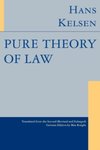


 Nemecký jazyk
Nemecký jazyk 
